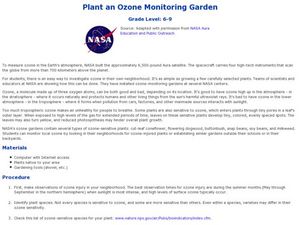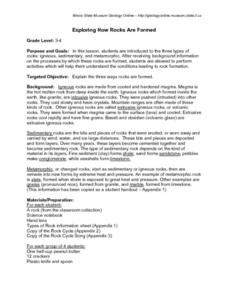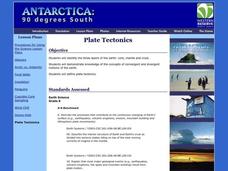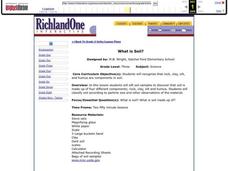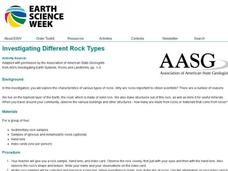Curated OER
Greenhouse Gases: The Chemistry Behind the Culprits
Ninth graders investigate the effect of different gases in the atmosphere. In this chemistry lesson, 9th graders explain how these gases contribute to global warming. They suggest possible solutions to this growing problem.
Curated OER
Plant an Ozone Monitoring Garden
Students create a garden. In this ozone lesson, students discuss ozone injury, identify plants sensitive to ozone, and then plant their own ozone garden.
Curated OER
What's the Connection Between Convection and Inversion?
Ninth graders observe a simulation demonstrating the difference between convection and inversion. They explain where and when convection and inversion layers occur and how each impacts air quality, and by connection, human health.
Curated OER
Ice Core Clues
Students create a PowerPoint presentation on the information they research about the ice cores and what they tell us about Earth's past. In this ice core lesson plan, students research radioactivity, air pollution, sodium, snowfall...
Curated OER
What's the Difference?
Students discover how volcanic processes differ at convergent and divergent tectonic plate boundaries. They identify three geologic features that are associated with most volcanoes on Earth.
Curated OER
Weather and Atmosphere
Seventh graders explain the layers of the atmosphere. They identify the causes of air pollution. They analyze real world weather data. They explore and describe clouds. They develop models to explain atmosphere and weather.
Curated OER
Determining the Percolation Rate of Soil
Students discover how water moves through different types of soils. In groups, they use the same sample from a previous activity and empty it into a milk carton in which they have layered with cheesecloth to determine the percolation...
Curated OER
Core
Eighth graders examine conditions that can lead to the formations found and correlate the layers. In this rock layers lesson students complete an activity that allows students to take their own "core sample".
Curated OER
Exploring How Rocks Are Formed
These lessons produced by the Illinois State Museum are quite good. In this one, third and fourth graders are introduced to the three basic types of rocks: igneous, sedimentary, and metamorphic. They perform activities which help them...
Curated OER
The Formation of Coal
In this coal formation worksheet, students read and informational sheet about coal formation. Students are given 5 short-answer questions regarding what they've read.
Curated OER
Air Quality Issues
Learners study and chart the levels of the atmosphere. They determine volume and location of the whole in the ozone layer by problem solving and drawing Antarctica.
Curated OER
Science: What Happens to Create the Lode?
Students understand how mineral deposits are formed and why they are not evenly dispersed. They create and describe three different precipitates from four solutions simulating mineral ore deposit formation in sedimentary rock.
Curated OER
Air Quality and Transportation
Second graders study about air pollution and the effects it has on our Earth. Students tally cars on a sheet that has been categorized as follows: One person in car, two persons in car, or three or more persons in car. Students go to...
Curated OER
Plate Tectonics
Young scholars identify the three layers of the earth: core, mantle and crust. They demonstrate knowledge of the concepts of convergent and divergent motions of the earth and an understanding of plate tectonics.
Curated OER
Mountain Building
Teacher prepares four layers of Plasticine stacking layers on top of each other to create a model of how rocks within the earth can be folded creating anticlines and synclines below the surface and mountains and valleys on the surface.
Curated OER
Using Radiosonde Data From a Weather Balloon Launch
Student use radiosonde data from a weather balloon launch to distinguish the characteristics of the lower atmosphere. They learn the layers of the atmosphere. They graph real atmospheric data.
Curated OER
Cupcake Core Sampling
Students discuss core samples. In this environment lesson plan, students experiment discovering what is beneath the surface by using cupcakes as models finding out what sort of layers are found within the cupcakes.
Curated OER
As the Sun Burns
Students examine the types of light the sun gives the Earth. They describe the electro-magnetic spectrum and how to protect themselves from different types of light. They identify the layers of the atmosphere as well.
Curated OER
Our Solar System
Learners analyze the theories of the formation of the universe and solar system. Students analyze planetary motion and the physical laws that explain that motion: Rotation, Revolution, Apparent diurnal motions of the stars, sun, and...
Curated OER
Pollution - What is It Doing to Us?
Students recognize some forms of pollution. In this science lesson plan, students recognize and understand some of the devastating effects of the acid rains and other possible factors that are contrary to the pH balance of nature.
Curated OER
What is Soil?
Third graders examine what makes soil by creating a Venn Diagram. In this Earth environment lesson, 3rd graders identify the different components that soil is made from. Students bring soil from their homes to examine and create a...
Curated OER
Temperature in The Atmosphere
In this science worksheet, middle schoolers find the answers to the five questions and they fill in the graphic organizer for the temperatures found in different heights of the atmosphere.
Curated OER
Forces and Newton's Laws Unit
Students participate in lessons on Forces and Newton's Laws by selecting activities and assignments to complete in a Layer Unit. Students select assignments and activities in the C Level, B Level, and A Level.
Curated OER
Investigating Different Rock Types
Students analyze a rock using their eyes and then a hand lens. In this science lesson plan, students determine and discuss how hard or how easy it was to find and classify the assigned rock. Students record their observations on an...



